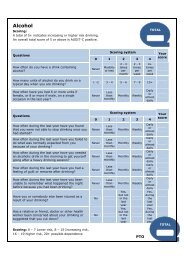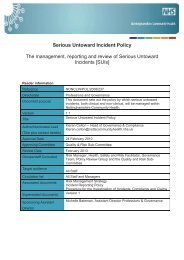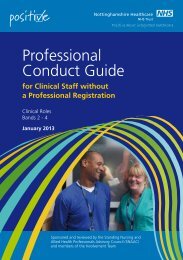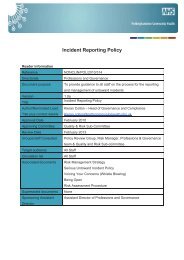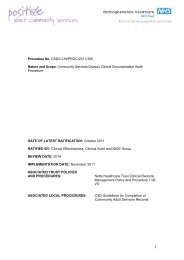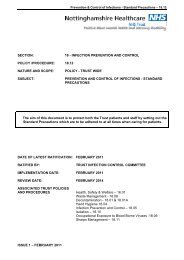Consent to Examination or Treatment Policy - Nottinghamshire ...
Consent to Examination or Treatment Policy - Nottinghamshire ...
Consent to Examination or Treatment Policy - Nottinghamshire ...
You also want an ePaper? Increase the reach of your titles
YUMPU automatically turns print PDFs into web optimized ePapers that Google loves.
ISSUE 6 – AUGUST 2012 15<br />
<strong>Consent</strong> <strong>to</strong> <strong>Examination</strong> <strong>or</strong> <strong>Treatment</strong> – 1.03<br />
Where persons with parental responsibility disagree as <strong>to</strong> whether these procedures are in<br />
the child’s best interests, it is advisable <strong>to</strong> refer the decision <strong>to</strong> the courts. It is possible that<br />
maj<strong>or</strong> experimental treatment, where opinion is divided as <strong>to</strong> the benefits it may bring the<br />
child, might also fall in<strong>to</strong> this categ<strong>or</strong>y of imp<strong>or</strong>tant decisions, although such a case has not<br />
yet been considered in the English courts.<br />
19.9 Where there is doubt about whether a parent is acting in the interest of the child <strong>or</strong> young<br />
person, then the healthcare practitioner would be unwise <strong>to</strong> rely on the parent’s consent, f<strong>or</strong><br />
example if a child alleges abuse and the parent supp<strong>or</strong>ts psychiatric treatment f<strong>or</strong> the child.<br />
The Government’s guidance W<strong>or</strong>king Together <strong>to</strong> Safeguard Children covers situations<br />
involving parental consent where abuse <strong>or</strong> neglect is suspected.<br />
19.10 In <strong>or</strong>der <strong>to</strong> consent on behalf of a child, the person with parental responsibility must<br />
themselves have capacity. Where the person with parental responsibility f<strong>or</strong> a child are<br />
themselves under 18, they will only be able <strong>to</strong> give valid consent f<strong>or</strong> the child’s treatment if<br />
they themselves are Gillick competent (see paragraphs 6–11 above). Whether <strong>or</strong> not they<br />
have capacity may vary, depending on the seriousness of the decision <strong>to</strong> be taken.<br />
19.11 There are situations where refusal <strong>or</strong> withdrawal of prescribed medical and therapeutic<br />
treatment f<strong>or</strong> children (0 – 18 years) may constitute neglect, and it is imp<strong>or</strong>tant f<strong>or</strong> staff <strong>to</strong> be<br />
aware of the following:<br />
Where parents, the child <strong>or</strong> others refuse, withdraw <strong>or</strong> actively withhold commonly available<br />
food <strong>or</strong> fluids, <strong>or</strong> fail <strong>to</strong> co-operate with prescribed medical <strong>or</strong> therapeutic treatment such that<br />
a child suffers, <strong>or</strong> is likely <strong>to</strong> suffer significant harm <strong>or</strong> in extreme circumstances, may die,<br />
this is neglect. A referral should be make immediately <strong>to</strong> LSA Children’s Social Car under<br />
the local Safeguarding Board Child Protection procedures.<br />
Attempts <strong>to</strong> justify the above neglect on some basis may be misguided believed <strong>to</strong> be in the<br />
child’s best interest, such as:<br />
• The religion of the child / parent / carer<br />
• Cultural expectations<br />
• Disability of the child including learning disability<br />
19.12 Such reason <strong>or</strong> conviction may be advanced by a parent the child <strong>or</strong> a practitioner, including<br />
a medical practitioner <strong>or</strong> any combination of these.<br />
Such inf<strong>or</strong>mation and reasons however, do not change the legal duties of the Local<br />
Safeguarding Children’s Board agencies <strong>to</strong> safeguard the child’s best interest; this may<br />
result in LA Children’s Social Care taking legal advice.<br />
19.13 Where a child is a ward of court, no imp<strong>or</strong>tant step may be taken in the life of the child<br />
without the pri<strong>or</strong> consent of the court. This is likely <strong>to</strong> include m<strong>or</strong>e significant medical<br />
interventions but not treatment f<strong>or</strong> min<strong>or</strong> injuries <strong>or</strong> common diseases of childhood.<br />
19.14 In an emergency, it is justifiable <strong>to</strong> treat a child who lacks capacity without the consent of a<br />
person with parental responsibility, if it is impossible <strong>to</strong> obtain consent in time and if the<br />
treatment is vital <strong>to</strong> the survival <strong>or</strong> health of the child.<br />
20.0 PROVISION OF INFORMATION<br />
20.1 The provision of inf<strong>or</strong>mation is central <strong>to</strong> the consent process. Bef<strong>or</strong>e patients can come <strong>to</strong> a<br />
decision about treatment, they need comprehensible inf<strong>or</strong>mation about their condition and<br />
about possible treatments/investigations and their risks and benefits (including the<br />
risks/benefits of doing nothing). Drawings, diagrams and models may be used <strong>to</strong> facilitate<br />
this process where appropriate.



